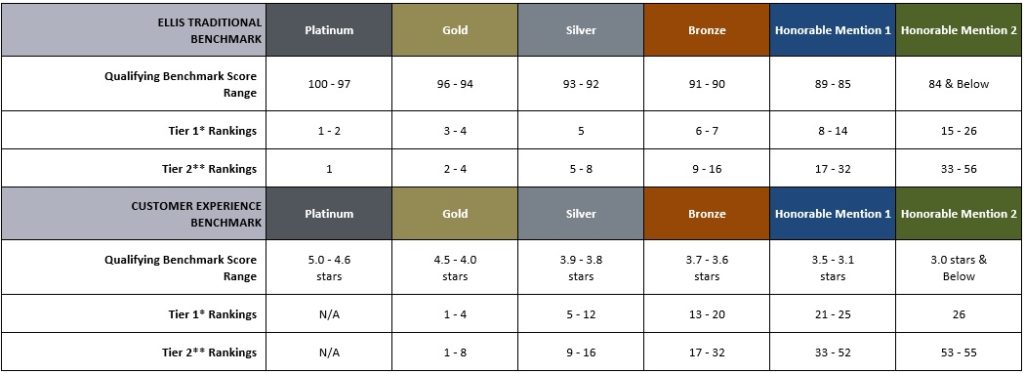Third Quarter 2017 Benchmark Results for Mystery Shops and Resident Surveys Executive Summary
Since 1984, Ellis, Partners in Management Solutions has specialized in helping the multifamily industry achieve their business goals by optimizing the customer experience at key touch points from initial visit to move-out through our Apartment Mystery Shops, Resident Surveys, and Training solutions. As we approach the year 2020, the ability to give external customers what they really need and want will depend on how well leaders do the same for their internal customers. Our mystery shops, resident surveys, and training are resources that can be used independently to address specific needs or together as a turnkey program for ongoing employee performance optimization.
We believe that the more you know about your customers and what they have to say about your people and product, the better you can respond to their needs. By optimizing the customer experience at key touch points from initial visit to move-out through our Apartment Mystery Shops, Resident Surveys, and Training solutions, your employees will learn how to best respond. As a result, the more successful you will be at developing loyal customers who pay more, stay longer, and refer friends and family.
Our letter series this year “Millennials: Identifying Missing Pieces in the Workplace” focuses on four core areas: basic need, contribution, feeling of belonging, and personal growth. This quarter we explore their desire for a sense of belonging in the workplace – what type of company culture will draw them in and retain them.
We thank you for joining us each quarter as we convey combined Benchmark results and sales trends, and offer practical improvement ideas.
Third Quarter 2017 Benchmark: Overall Results
Mystery Shops
Ellis benchmarks mystery shop performance on the 10 key Benchmark questions and the Customer Experience. Companies can qualify for platinum, gold, silver, or bronze level based on their company’s overall Benchmark score for the quarter.
In 2016, the overall average Ellis Traditional Multifamily Industry Benchmark score across Ellis’ entire database of eligible shops1 was 85%, representing 41,894 shops, compared to 84% in the Third Quarter 2017, representing 10,374 shops. In 2016, the overall average Ellis Customer Experience Benchmark score was 3.5, versus a marginal increase to 3.6 for the Third Quarter 2017.

* Tier 1 = 70 or more shops
** Tier 2 = 30-69 shops
Resident Surveys
The Ellis Loyalty Benchmark identifies and recognizes the customer experience performance of companies subscribed to the Ellis Resident Survey Program. It evaluates performance on 5 key touchpoints (lead conversion, move-in, maintenance, renewal, move-out) of the prospect and resident journey. The percentage of surveys responded to by the onsite team and the average number of days it took the team to respond are also measured, as these two factors impact the customer relationship and overall loyalty. Utilizing customer loyalty as a metric allows customer-centric companies the ability to forecast three specific customer behaviors: likelihood to convert/renew, willingness to pay more, and likelihood to recommend.
Effective First Quarter of 2017, Ellis changed the loyalty score to a scale of 0%–100% from a scale of -100%–100%. The change in scale is reflected in the scores for this quarter (see chart below):

The overall average Ellis Loyalty Benchmark in 2016 was 73%; the score held at 73% for Third Quarter 2017. In 2016, the onsite response rate averaged 78%; Third Quarter 2017 reflects an increase to 87%. Teams took an average of 5.6 days to respond in Third Quarter 2017 versus an average of 7.8 days in 2016

CONGRATULATIONS TO ELLIS BENCHMARK’S TOP PERFORMING COMPANIES THIRD QUARTER 2017
Mystery Shops
Ellis Traditional Benchmark Platinum Level Achievers
Tier 1 (70 or more completed shops)
- Gables Residential
- Western National Property Management
Tier 2 (30-69 completed shops)
- Legacy Partners Residential, Inc.
Ellis Customer Experience Benchmark Gold Level Achievers
Tier 1 (70 or more completed shops)
- AMLI Residential
- Bozzuto & Associates
- Gables Residential Services
- Preferred Residential Management
- Windsor Property Management Co / GID
Tier 2 (30 – 69 completed shops)
- IMT Residential
- Irvine Company Apartment Communities
- Legacy Partners Residential, Inc.
- Matrix Residential
- Mill Creek Residential Trust
- Richman Property Services, Inc.
- Wood Partners
- ZRS Management, LLC
Resident Surveys
Ellis Best in Class Achievers
Tier 1 (1600 or more surveys received)
- Block Multifamily Group, LLC
- CWS Apartment Homes, LLC
- Lincoln Property Company
- LMC, a Lennar Company
- Manco Abbott
- Olympus Property
- Simpson Property Group
Tier 2 (1599 or fewer surveys received)
- Capstone Real Estate
- Carlisle Property Management
- GDC Properties, Inc.
- Landmark Communities
- Mack Urban Communities
- Reybold Venture Group
- Reynolds Asset Management
- StarPoint Properties
- Sunrise Management & Consulting
- TM Realty Services
*Companies are listed in alphabetical order
ELLIS’ THIRD QUARTER 2017 BENCHMARK: QUESTION/TOUCHPOINT RESULTS
Mystery Shops
How did we do?
The chart below reflects the average Third Quarter 2017 score of Ellis’ entire database of eligible shops1 for each of the 10 key benchmark questions, the Customer Experience by category, and the combined overall Benchmark scores.


Resident Surveys
The chart below reflects the average scores across all Ellis Resident Survey companies for each survey touchpoint for Third Quarter 2017, and the combined overall loyalty score and average accountability performance results.

Millennials: Identifying Missing Pieces in the Workplace- Part III
What type of company culture is most appealing to the Millennial generation? According to a recent survey sampling of 13,882 Millennials by SurveyMonkey and phone interviews we conducted, they are drawn to career growth, flexibility, and a sense of purpose. Interestingly, adjusting corporate culture to appeal to this group is being adopted by more and more companies and for good reason – it is a relationship. How can the multifamily industry adapt and speak to the career needs and desires of this powerhouse generation? Here are some of our findings and insights.
1. INSPIRE CAREER GROWTH
You have probably heard this statement at some point in your career: “In order to climb the career ladder, you have to put in your time and pay your dues.” Millennials do not buy into the notion that your value is simply based on the hours at the desk and years of service. While the accomplishment is admirable, they believe a person’s value at work should be based on performance achievement. Millennials want jobs to be development opportunities, according to Gallup. It is not enough to advertise “room for growth” to draw in these ambitious employees – you have to back it up. While the reality is that no company can guarantee staffing needs in the future, managers must prepare their team for that day. This means exploring their potential right where they are and accomplishing these three things with every employee:
- Coaching A study conducted by Interact and Harris, found that 69% of managers are uncomfortable communicating with their direct report, and over a third struggle with giving direct performance feedback. Employees are generally rewarded for their individual skills and their ability to get tasks done. Coaching does not come naturally to most. It is not a surprise that when employees are promoted they are often unprepared to lead. “The best leasing consultants are not necessarily the best property managers, yet they are often promoted,” shared one of our interviewees. We must equip property managers to communicate, mentor, inspire, and authentically care about their employees. Whether this skill is learned in workshops, through mentoring, or modeled by strong coaches, they need to be able to practice in real-time situations. A great way to exercise this skill is by delegating small tasks to direct reports and creating coaching opportunities. A coaching approach, versus a top-down ‘I’m the boss’ approach gives you a power tool for increasing engagement among Millennial employees.
- Ask Questions and Listen – Blocking time each day to ask questions and listen to team members can help create a culture full of confidence, trust, and a feeling of belonging, as well as inspire growth. Even though they are often referred to as the ‘trophy kids’, Millennials do not need or want your questions or comments to be sugar-coated. Mentoring conversations should take place frequently and after events such as handling a resident complaint or even an interoffice dispute. Ask these four questions: What did you expect would happen? What actually happened? Why was there a difference? What can we learn from this? Listen carefully to the answers.
- Give Feedback Before the Game is Over – Can you imagine a baseball coach waiting an entire year to deliver feedback to a player to help him improve? That would be crazy! Yet, that is what we often do in the workplace. Feedback should be timely and actionable. It should happen when the game is being played, not when it is over. A global survey conducted by SuccessFactors, found that Millennials want feedback 50% more often than other employees. Managers need to check in with their employees on an ongoing basis as they seek out opportunities to teach, correct, and encourage with feedback. In the book, Work Happy: What Great Bosses Know by Jill Geisler, the author outlines strategies for effective feedback. “Maximum feedback is achieved when the person giving it is credible and respected, the content is fair and useful, and the receiver understands and acts on it. Provide ongoing and useful feedback so people never wonder where they stand with you or their co-workers. Uncertainty feeds fear. Fear erodes trust.”
The next generation workforce wants more out of their career than just a paycheck. Skilled and trained managers effectively communicate and align organizational and employee purpose, focus on outcomes instead of paperwork, and sincerely care about the success of their people.
2. DEFINE FLEXIBILITY
Workplace flexibility has become an important focus of many working people, especially Millennials. Interestingly, a Bentley University study indicated that 77 percent of Millennials believe that a flexible schedule would make them more productive. Yes, this is a generation who does not believe that productivity should be measured by the number of hours worked at the office but rather by the output of the work performed. One Millennial we spoke with shared his thoughts on workplace flexibility: “I want to be free! If I want to work early, I can. If I want to work late, I can do that, too. It doesn’t matter where I accomplish my work, as long as it gets done and I deliver. I am valued by what I produce.” Unfortunately, this does not necessarily work in the leasing office where their value is tied to being available to customers during a specific time period. Does this mean that all Millennials are not a good fit for the leasing office? No, it does not.
- The Flexible Leasing Flexibility does exist in on-site positions because employees are not attached to their desk. On-site employees have the freedom to walk the community, visit with residents, outreach to local businesses, and assist customers in a variety of ways. They can be a counselor, pet whisperer, banker, bill collector, social media expert, policy violation officer, outreach marketing director, marketing and sales expert, event organizer, and more. A Millennial and former property management employee shared, “Automation and new technology platforms in the property management industry are relieving the need for in-person interaction in some instances. While managers can benefit most because they have the ability to check many performance markers remotely, a position such as a traveling leasing consultant can be very appealing and satisfy the need for flexibility, too.”
- Flexible Workspace – Have you read about the disappearing office? Some believe that by the year 2030, professionals will work mostly from home using super-fast data terminals. Does this sound like the Jetsons? We there yet, and it is unlikely that we will see an empty leasing office, but are there changes that could take place that would be easier to swallow? Yes. Job-sharing (splitting the time and workload for one job), and day-shifting (some employees work 7am-3pm, while others work 10am-6pm) are becoming very common in many industries. Could they work in our industry? Potentially. Another popular trend is the third space. Third spaces are an easy way to insert flexibility into the workspace and boost productivity. The name “third space” describes the third of three spaces where people can potentially perform work (home, desk, space). In these areas more informal conversations and meetings can occur with customers, peers, and managers. The more Millennials dominate the workplace, the more push there will be for flexible options in the workplace. It is time to get creative!
Managers can use these insights as a launching point to build flexibility into company culture and workplace policies. When the largest portion of the work force begins demanding better flexibility, it is time to listen!
3. CREATE A SENSE OF PURPOSE
Purposeful work is so important to these young business-minded individuals that they are willing to make less money in exchange for meaningful employment. A study found that over 90 percent of business students said they would forfeit a percentage of forthcoming earnings to work for a company actively involved in corporate social responsibility. The multifamily industry is certainly playing its part in this movement, as it aligns itself with the desires of Millennials. Pull up a handful of property management websites and you will see links to green initiatives, community volunteer opportunities, employee spotlights, cancer awareness events, and the list goes on. While great strides are being made in social initiatives, there are many Millennials sitting in leasing chairs who really do not understand who they work for and why they are there. They are not alone. “Many employees are not engaged at work, because they feel a lack of a connection while their bosses continue to ask them to spend more time and energy at the office,” said Gretchen Spreitzer, a professor at the University of Michigan in Ann Arbor.
- Define the Business Goals – Managers should take time to educate employees on the various parts of the business. Do they understand how their role impacts the rest of the company? Do they know who owns their community/company and what their goals are for their investment? Do they understand how the company grows and the steps that take place to make that happen? Do they know how the company compares to other competing property management companies? Do they understand how that one lease or one move-out impacts the bottom line? Too often, the only information they receive is that the community did or did not make its numbers and that they are over budget. This is a generation with great ideas and insight, and they are the leaders of tomorrow. The greatest gift a manager can give these employees is knowledge and a sense of purpose. Do you offer opportunities for on-site employees to interact with and experience the corporate or regional level teams and activities? Is leadership accessible to all employee, or only those who fall within the appropriate chain of command?
All things considered, companies that weave career growth, flexibility and sense of purpose within the fabric of the workplace will be better positioned to attract and retain top talent, optimize productivity, increase the bottom line, and shape the future we all want for the next generation. How does your company culture match up to the needs and desires of the Millennial employee?
Join us next quarter when we finalize our exploration into our series Millennials: Identifying Missing Pieces in the Workplace.
We thank you for your ongoing participation and feedback, which help make this report informative, fresh, and a reliable resource. We hope you will find Ellis Partners in Management Solutions to be not only the finest source for mystery shopping and resident surveys but also a training resource for your organization. Additional support and information can be found on our website.
October 31, 2017
Prepared by Joanna Ellis, Chief Executive Officer and Francis Chow, Chief Strategic Officer
Footnotes: 1 See Ellis website for Benchmark eligibility, tier level, and recognition requirements for mystery shops and resident surveys. 2 No tier or rank is provided when minimum requirements are not met.

